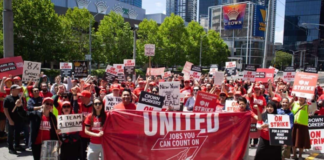Greek workers held their first general strike of the year in February—their eighth in just 12 months. Work stoppages and nearly 60 demonstrations demanded an end to the government’s three-year austerity program that has slashed wages and pensions and brought government spending to a halt. Workers are now paying 23 per cent in value added taxes (like the GST), up from 19 per cent.
Education cuts are so severe that some schools are expected to close. Teachers showed their anger in a 48-hour strike. They brought a huge contingent to the Athens demonstrations, joining nearly 100,000 protestors amassed near the parliament.
Ferry workers ignored a martial order placed on them by the government in order to join bus, train and airline staff on strike. Nearly 50 domestic flights were cancelled so that air traffic controllers could participate in a four-hour walk off.
The Greek Prime Minister George Papandreou tried to appeal to demonstrators, lying through his teeth when he said, “Sometimes even I myself feel an urge to join the ranks of protesters…but mere protesting leads nowhere.”
The truth is Papandreou intends to keep punishing the Greek people to do the bidding of the IMF and the European Central Bank. At the Eurozone summit in early March he confirmed a $71 billion sale of public assets, including the sale of some state-owned Greek islands.
Last year Greece’s economy contracted by 4.5 per cent and the finance minister expects a further 3 per cent this year. Unemployment is at 13.9 per cent with youth unemployment at 35.6 per cent, and 120,000 small businesses are estimated to go bankrupted this year. The government intends to make workers pay the price, and the movement needs to deepen its resistance in response.
This means turning one-day work stoppages into indefinite strikes, and workplace occupations. The uprisings in Egypt and across the Middle East are providing the kind of inspiration that is needed. One of the popular slogans on the streets of Athens is “Let’s have Cairo everywhere!”
Erima Dall





